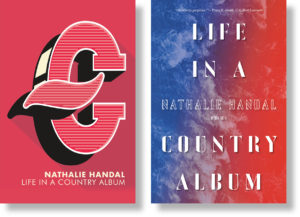By Nathalie Handal
Reviewed by Lena Khalaf Tuffana
The University of Pittsburgh Press, United States,
115 pages, $14
flipped eye publishing, United Kingdom,
104 page, £6.95
In her seventh collection, award-winning poet Nathalie Handal reaffirms that she remains an urgent and singular voice in contemporary poetry.
In After the Last Sky, Edward Said writes the following about the Palestinian consciousness forged by exile and occupation: “A part of something is for the foreseeable future going to be better than all of it. Fragments over wholes. Restless nomadic activity over the settlements of held territory. Criticism over resignation.” Though Handal is of many cultures, in her latest collection, Life in a Country Album, she brings this particular Palestinian sensibility to her poems and to her encounters with her many countries and languages of the text. Handal’s upbringing spans continents, and she is at home in English, French, Spanish, Italian, and Arabic, just as she is in many countries, from her birthplace of Haiti to her familial homes in Bethlehem and Jerusalem, and in the cities of Europe, Latin America, and the United States where she is in constant motion. Life in a Country Album chronicles her life between two nations in particular: the United States and France. In multilingual poems, Handal explores speech and its fractures through the lens of belonging and diasporic wandering.
In “[Album arabe à Paris—Place Des États Unis, Conversations Avec Mahmoud Darwish],” she is present there as an Arab, and in conversation with Darwish, Palestine’s poet, whose own exile and travels cast shadows over her own. In “[Album Mediterranée],” the poems attend to the emotional landscapes of refugees, the displaced of countries near or bordering the Mediterranean. Handal crafts lustrous forms for each poem, designing spaces with an architect’s precision and elegance. The lines of “Letter from the Levant” cluster around the names of cities at the center of the poem, evoking the crowded longings of their exiles. In contrast, the short, broken lines of “The Oranges” convey generational Palestinian grief with breathtaking restraint. This album grieves deeply, but it also leans towards hope.
In “Orphic,” Handal writes: As a child I believed / God was in the wind / that carried us elsewhere / that departures were returns. Like Orpheus, Handal and her speaker grieve the losses of history, old and new. But her response resists stasis, and so she crafts these songs of cities, of displacements that connect her to the millions of us navigating our own exiles.


